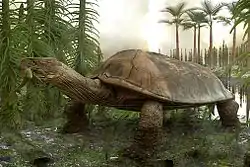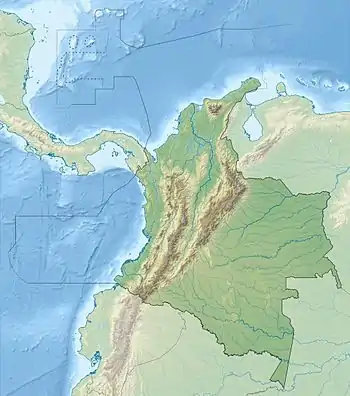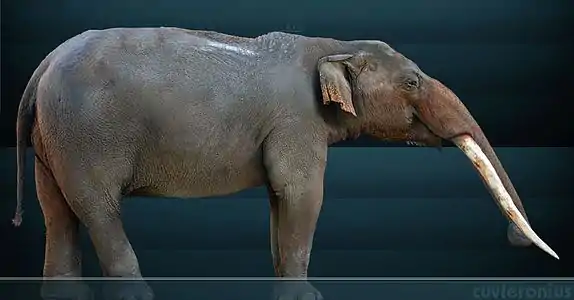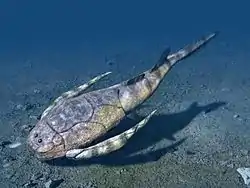Carbonemys
Carbonemys cofrinii is an extinct podocnemidid turtle known from the Middle Paleocene Cerrejón Formation of the Cesar-Ranchería Basin in northeastern Colombia. The formation is dated at around 60 to 57 million years ago, starting at about five million years after the KT extinction event.[1]
| Carbonemys | |
|---|---|
 | |
| Life restoration of Carbonemys | |
| Scientific classification | |
| Kingdom: | Animalia |
| Phylum: | Chordata |
| Class: | Reptilia |
| Order: | Testudines |
| Suborder: | Pleurodira |
| Family: | Podocnemididae |
| Genus: | †Carbonemys Cadena et al., 2012 |
| Type species | |
| †Carbonemys cofrinii Cadena et al., 2012 | |
Discovery
In 2005, the holotype specimen was discovered in the Cerrejón coal mine by a North Carolina State University doctoral student named Edwin Cadena. It had a shell that measured about 1.72 metres (5 ft 8 in), making it one of the world's largest turtles.[2][3]
The jaws of Carbonemys were massive and would be powerful enough to eat crocodilians, that were abundant in the first neotropical forest of the Cerrejón Formation.[4] This turtle coexisted with the giant boid (constrictor), Titanoboa.
References
- Cadena, E. A.; Ksepka, D. T.; Jaramillo, C. A.; Bloch, J. I. (2012). "New pelomedusoid turtles from the late Palaeocene Cerrejón Formation of Colombia and their implications for phylogeny and body size evolution". Journal of Systematic Palaeontology. 10 (2): 313. doi:10.1080/14772019.2011.569031. S2CID 59406495.
- "Researchers reveal ancient giant turtle fossil". Phys.Org. 17 May 2012. Retrieved 18 May 2012.
- Maugh II, Thomas H. (18 May 2012). "Researchers find fossil of a turtle that was size of a Smart car". LA Times. Retrieved 18 May 2012.
- "Car-sized Turtle Found in Colombian Coal Mine : Discovery News". News.discovery.com. 2012-05-18. Retrieved 2012-06-14.


.jpg.webp)
